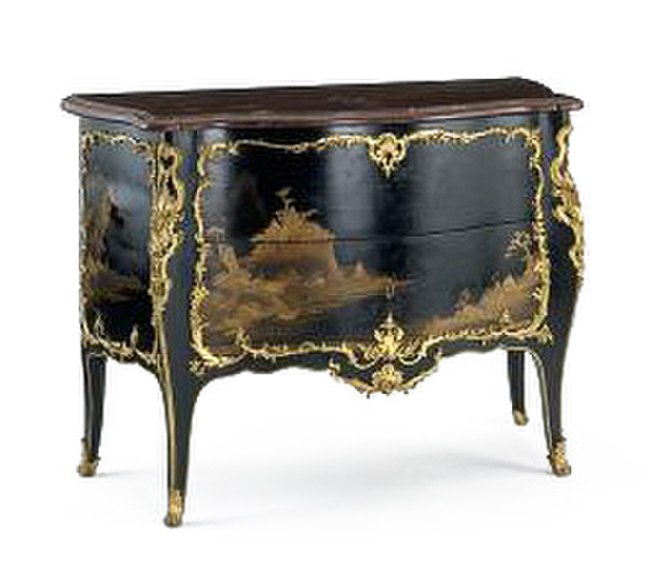Main Difference
The main difference between Commode and Toilet is that the Commode is a decoratiev chest of drawers made for displat as well as storage and Toilet is a sanitation fixture.
-
Commode
A commode is any of many pieces of furniture. The Oxford English Dictionary has multiple meanings of “commode”. The first relevant definition reads: “A piece of furniture with drawers and shelves; in the bedroom, a sort of elaborate chest of drawers (so in French); in the drawing room, a large (and generally old-fashioned) kind of chiffonier.” The drawing room is itself an term for a formal reception room, and a chiffonier is, in this sense, a small sideboard dating from the early 19th century.
Another meaning attested is a washstand, a piece of furniture equipped with basin, jug, and towel rail, and often with space to store the chamber pot behind closed doors. A washstand in the bedroom pre-dates indoor bathrooms and running water.
In British English, “commode” is the standard term for a commode chair, often on wheels, enclosing a chamber pot—as used in hospitals and the homes of invalids. In the United States, a “commode” is a colloquial synonym for a flush toilet.The word commode comes from the French word for “convenient” or “suitable”, which in turn comes from the Latin adjective commodus, with similar meanings.
-
Toilet
A toilet is a piece of hardware used for the collection or disposal of human urine and feces. In other words: “Toilets are sanitation facilities at the user interface that allow the safe and convenient urination and defecation”. Toilets can be with or without flushing water (flush toilet or dry toilet). They can be set up for a sitting posture or for a squatting posture (squat toilet). Flush toilets are usually connected to a sewer system in urban areas and to septic tanks in less built-up areas. Dry toilets are connected to a pit, removable container, composting chamber, or other storage and treatment device. Toilets are commonly made of ceramic (porcelain), concrete, plastic, or wood.
In private homes, the toilet, sink, bath, or shower may be in the same room. Another option is to have one room for body washing (bathroom) and a separate room for the toilet and handwashing sink (toilet room). Public toilets consist of one or more toilets (and commonly urinals) which are available for use by the general public. Portable toilets or chemical toilets may be brought in for large and temporary gatherings.
Many poor households in developing countries use very basic, and often unhygienic toilets, for example simple pit latrines and bucket toilets which are usually placed in outhouses. Globally, nearly one billion people have no access to a toilet at all, and are forced to do open defecation (particularly in India). Diseases transmitted via the fecal-oral route or via water, such as cholera and diarrhea, can be spread by open defecation. They can also be spread by unsafe toilets which cause pollution of surface water or groundwater. Historically, sanitation has been a concern from the earliest stages of human settlements. The Sustainable Development Goal Number 6 calls for “adequate and equitable sanitation and hygiene for all and end open defecation by 2030”.
-
Commode (noun)
A low chest of drawers on short legs.
-
Commode (noun)
A stand for a washbowl and jug.
-
Commode (noun)
A chair containing a chamber pot.
-
Commode (noun)
A toilet.
-
Commode (noun)
A kind of woman’s headdress, raising the hair and fore part of the cap to a great height.
-
Toilet (noun)
Personal grooming, in other words washing, dressing, etc. from 17th c.
-
Toilet (noun)
One’s style of dressing: dress, outfit. from 18th c.
-
Toilet (noun)
A dressing room. from 19th c.
-
Toilet (noun)
A room or enclosed area containing a id=fixture: a bathroom or water closet. from 19th c.
“Sorry, I was in the toilet.”
-
Toilet (noun)
A small secondary lavatory having a id=fixture and sink but no bathtub or shower.toilet
-
Toilet (noun)
A chamber pot.
-
Toilet (noun)
A fixture used for urination and defecation, particularly those with a large bowl and ring-shaped seat which use water to flush the waste material into a septic tank or sewer system. from 19th c.
“My toilet backed up. Now the bathroom’s flooded.”
-
Toilet (noun)
A very shabby or dirty place. from 20th c.
-
Toilet (noun)
A covering of linen, silk, or tapestry, spread over a table in a chamber or dressing room.
-
Toilet (noun)
A dressing table.
-
Toilet (verb)
To dress and groom oneself
-
Toilet (verb)
To use the toilet
-
Toilet (verb)
To assist another (a child etc.) in using the toilet
-
Toilet (noun)
a fixed receptacle into which a person may urinate or defecate, typically consisting of a large bowl connected to a system for flushing away the waste into a sewer
“Liz heard the toilet flush”
“a toilet seat”
“he got up to go to the toilet”
-
Toilet (noun)
a room, building, or cubicle containing a toilet or toilets
“someone pushed at the toilet door”
“a public toilet”
-
Toilet (noun)
the process of washing oneself, dressing, and attending to one’s appearance
“her toilet completed, she finally went back downstairs”
-
Toilet (noun)
denoting articles used in the process of washing, dressing, and attending to one’s appearance
“a bathroom cabinet stocked with toilet articles”
-
Toilet (noun)
the cleansing of part of a person’s body as a medical procedure.
-
Toilet (verb)
assist or supervise (someone, especially an infant or invalid) in using a toilet.
-
Toilet (verb)
use a toilet
“sufferers may need help with dressing, bathing, and toileting”

